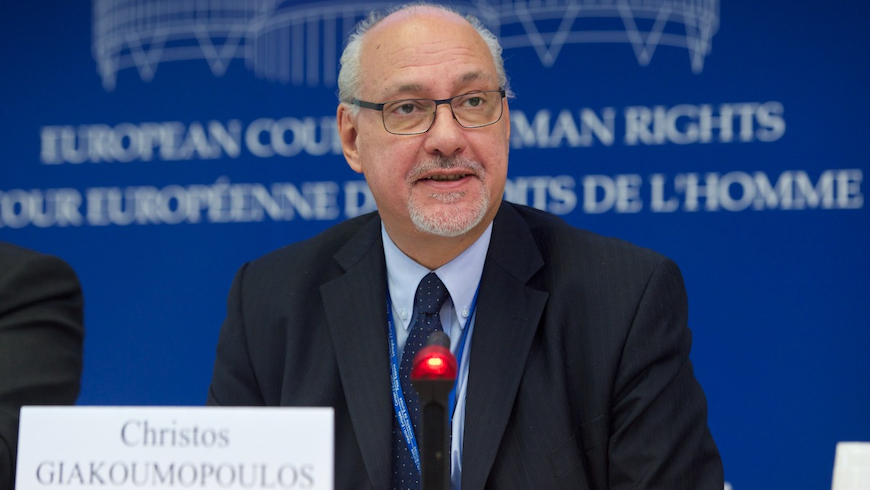Speech by Christos Giakoumopoulos
“Protection of human life and public health in the context of a pandemic – Effectively responding to a sanitary crisis in full respect for human rights and the principles of democracy and the rule of law”, chaired by MFA Mr Miltiadis Varvitsiotis, in his capacity as Chair of the Committee of Ministers of the Council of Europe
17 June 2020, online
Dear Minister,
Thank you for the invitation and for the initiative of this conference.
No need to repeat the very valuable points that other speakers made today and on 3 June. I think that all those who took the floor during the 2 days of this event have stressed, on the one hand, the need for a coordinated reaction and concerted action of MS to the pandemic and in particular AFTER the pandemic crisis.
Much has been said about the need for strengthening multilateral action / solidarity / need to respect the fundamental values of DEMOCRACY, HR and RoL; be vigilant to avoid backslides in HR protection and in the functioning of Democratic institutions that may endanger the democratic nature and the cohesion of our societies.
Much has been said also about the role of the CoE in this field and of its added value.
I would just like to refer to 3 topics that illustrate the Organisation’s role and potential in this field and make the Council of Europe standards an indispensable element of States policies.
FIRST: The right to protection of HEALTH as human right is protected by a series of CoE binding instruments and mechanisms:
The right to life and the prohibition of torture and inhuman treatment belong to the core rights under the ECHR. They have consistently been held as recalled by the SG to impose positive obligations to protect people in State care against deadly diseases and the ensuing suffering.
The President of the CPT has referred to the CPT’s role in this respect and to the Statement of principles relating to the treatment of persons deprived of their liberty in the context of the COVID-19 pandemic
Beyond people in the states’ care, responsibility under Articles 2 and 3 of the ECHR protect patients, people with disabilities or elderly persons as the Commissioner Mijatovic recalled.
This positive obligation under the ECHR is further confirmed by Article 11 of the European Social Charter. States Parties must demonstrate their ability to cope with infectious diseases, by means of arrangements for reporting and notifying diseases and by taking all the necessary emergency measures in case of epidemics. The ECSR issued an interpretative statement on the right to the protection of health. I noted President Palmisano’s speech on 3 June according to which “the future should be constructed with the European Social Charter in one hand, and with legislative, regulatory and funding mechanisms in the other. The Charter should inspire the new social contract that world leaders now demand”
The ESC is - if not the only - at least the most comprehensive binding human rights instrument in the field of social rights. It represents, together with the ECHR, the European response to the UDHR. It is high time for the ESC to play an even more prominent role in shaping common and concerted responses to the crisis, to materialize the wish of States and citizens for more solidarity, prevent antagonistic policies that may expose people to extreme hardship and insecurity which will, in turn, feed anti-democratic and isolationist tendencies and affect progressively the sustainability of social peace and of the democratic institutions. I hope our Organisation will find, under your guidance and the guidance of future Chairmanships, the way to reinforce and, if appropriate, improve the ESC and its mechanism to make it an indispensable tool for shaping concerted and joint policies based on these fundamental human rights.
States’ increased attention to vulnerable groups would be consistent with the peoples’ right to equitable access to health care (Article 3 of the Convention on Human Rights and Biomedicine, “the Oviedo Convention”). “This Convention is the only legally binding instrument at international level in this field.
Mr Minister,
You participated at the launching event of the CoE Strategic Action Plan on Human Rights and Technologies in Biomedicine, 2020-2025. When it comes to health research and medicine, the Strategic Action Plan will play a key role in helping national authorities to achieve that. It draws on the principles laid out in the Oviedo Convention on Human Rights and Biomedicine, including equity of access to healthcare, consent, the protection of privacy and the confidentiality of health-related data. And its four pillars – governance, equity, integrity and
co-operation – will help national authorities to develop appropriate mechanisms, build trust and promote progress in the quest for advances in health care provision. The Council of Europe’s work in the field of Artificial Intelligence is also relevant for fighting the pandemic in a manner that complies with Human Rights and Rule of Law standards.
As the sanitary crisis is posing unprecedented challenges to the health sector, Governments will need to be extremely vigilant against counterfeit or falsified medicines and medical products, in particular but not only in the web. States can rely on the CoE MEDICRIME Convention to target the criminal behaviour of those who, like criminal networks, take advantage of the loopholes in our systems and of the current crisis. Mr Glagolev will say more about the Medicrime Convention. Let me just stress that while the Convention is in force, unfortunately, many CoE MS are not Parties to it. More commitment in this field is certainly needed.
Under both the ECHR and the European Social Charter states have a duty to inform the population about the known risks related to the pandemic and about behaviours or measures to avoid spreading the disease.
And most importantly, as our SG said in a recent conference “whatever measures are being considered during or after the crisis, people must have information and must have a say”.
This brings me to my SECOND illustration: the right to information
The freedom of expression, including free and timely flow of information as enshrined in Article 10 of the ECHR, is a critical factor for the ability of the media to report on the issues related to the pandemic. Media and professional journalists, in particular public broadcasters, have a key role and special responsibility for providing timely, accurate and reliable information to the public, but also for preventing panic and fostering people’s cooperation.
The CoE has a series of treaty instruments, starting of course with the ECHR, and soft law instruments and practical tools that may help MS to devise a common approach to this challenge. Governments’ action in this field will shape the landscape of freedom of expression and freedom of the press in Europe in the coming years and, consequently, the quality of our Democracy. As the ECtHR has repeatedly said, Freedom of Expression is the “cornerstone” of democratic societies.
The public’s access to official information must be managed on the basis of the existing principles set down in the Court’s case-law. The Convention on Access to Official Documents (“the Tromsø Convention”) underlines the need of transparency and provides that, at its own initiative and where appropriate, a public authority shall take the necessary measures to make public official documents to encourage informed participation by the public in matters of general interest. The Tromso Convention is now ratified by 10 States Parties and will thus soon enter into force. It would be important for MS who have not done so to ratify it.
Official communications cannot be the only information channel about the pandemic. This would lead to censorship and suppression of legitimate concerns. Journalists, media, medical professionals, civil society activists and public at large must be able to criticise the authorities and scrutinise their response to the crisis. The pandemic should not be used to silence whistle-blowers
(see Recommendation CM/Rec(2014)7 on the protection of whistle-blowers),[1] or political opponents.[2]
My third and final point relates to the protection of HR and the Environment
The joint declaration you have made Mr Minister together with the outgoing and incoming Georgian and German Presidencies of the CM stress the role of the Organisation in this field. Both the ECHR and the ESC enshrine rights (in particular the right to respect for private life under the ECHR or the right to Health under the ESC) which set the basis of the obligation of MS vis a vis their citizens to take measures to protect the environment. Courts of law of MS follow the case-law in this extremely challenging area where your CDDH is working too upon a mandate given by the CM to deliver a set of principles. ²
The rights approach which is followed by the CoE in this field creates a series of positive obligations for MS. Among other things, MS will have to take measures – including criminal law and other legislation - to prevent damage to the environment and to the right to life and health of their citizens.
The Coe offers an adequate platform to discuss these measures from a human rights perspective and also from a criminal law and civil / administrative law perspective. The CDDH, the CDPC and the CDCJ will certainly be the appropriate fora for this work, should you and the Committee decide to engage in this important endeavour for today’s and for future generations.
Thank you
[2]Pertinent guidance may be found in the Council of Europe Guidelines on protecting freedom of expression and information in times of crisis




